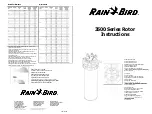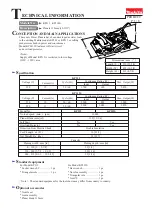
VT-I/F Vacuum Tube Instrument Interface
D.W. FEARN
24
Although you could purchase a batch of 12AY7s and select the quietest one(s),
it may be cost effective to buy a low-noise tube from the us. Current prices are
$35.00 for a selected low-noise 6072/12AY7. We test the tubes in a VT-I/F after a
burn-in period and grade them according to noise, microphonic response, and
other characteristics. A low-noise tube from us will meet the original VT-I/F spec-
ifications.
The base pins of vacuum tubes supplied by D.W. Fearn have been chemically
treated for low contact resistance and oxidation prevention. When handling these
tubes, care should be taken to avoid removing or contaminating the treatment. Use
a lint-free cloth or paper towel to avoid direct contact between any part of the tube
and your fingers.
Remember that vacuum tubes may be quite hot during operation. Protect your
fingers during tube replacement. The VT-I/F should be turned off before removing
tubes. Allow at least one minute for the filter capacitors to discharge before tube
removal or insertion.
Tubes are made of glass and will break if dropped or even bumped in a critical
area. Handle with care.
Electrolytic Capacitors
The VT-I/F is designed and built to last for a long, long time, and it is possible
that some components (e.g. electrolytic capacitors) may reach the end of their life
long before the equipment becomes obsolete. The electrolytic capacitors used in
the VT-I/F typically will last at least twenty years. If there is a measurable and/or
audible increase in 120 cps noise, the filter capacitors should be suspected. They
should be replaced with new capacitors of equivalent capacitance and voltage rat-
ing, and the replacements should be specified for a minimum ten-year service life.
Electrolytic capacitors are also used as plate and cathode decouplers. In choos-
ing a replacement, the same considerations as with the filter capacitors should be
followed.


































